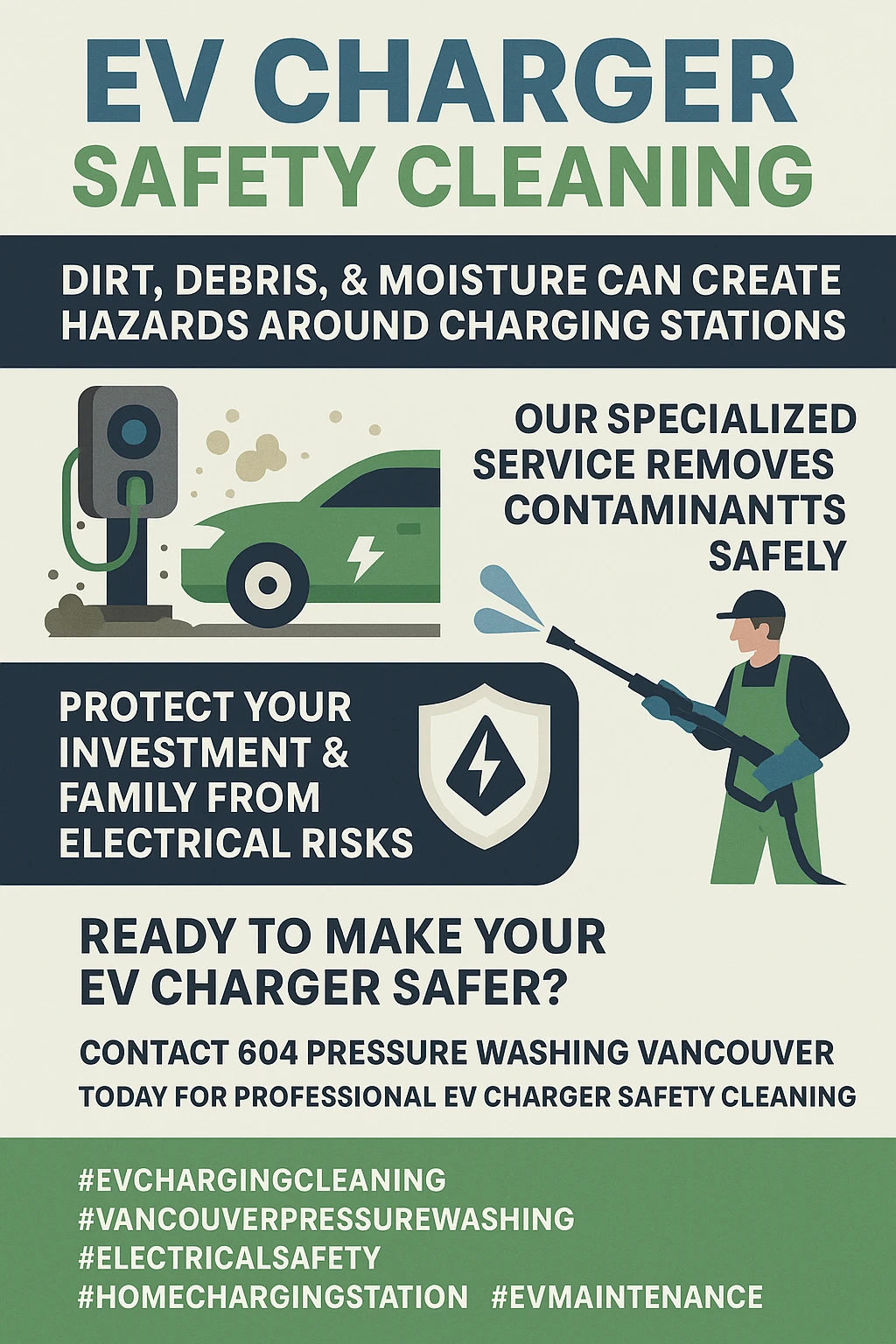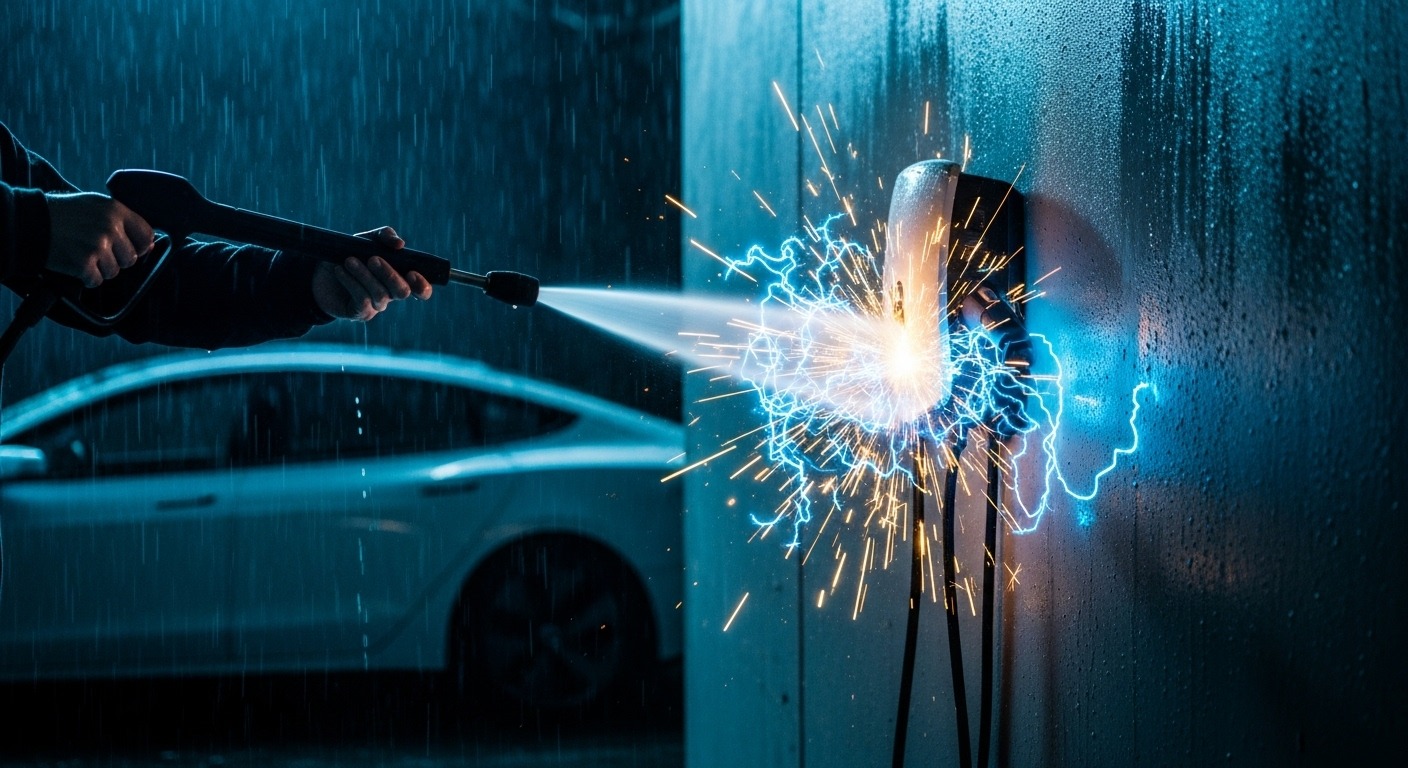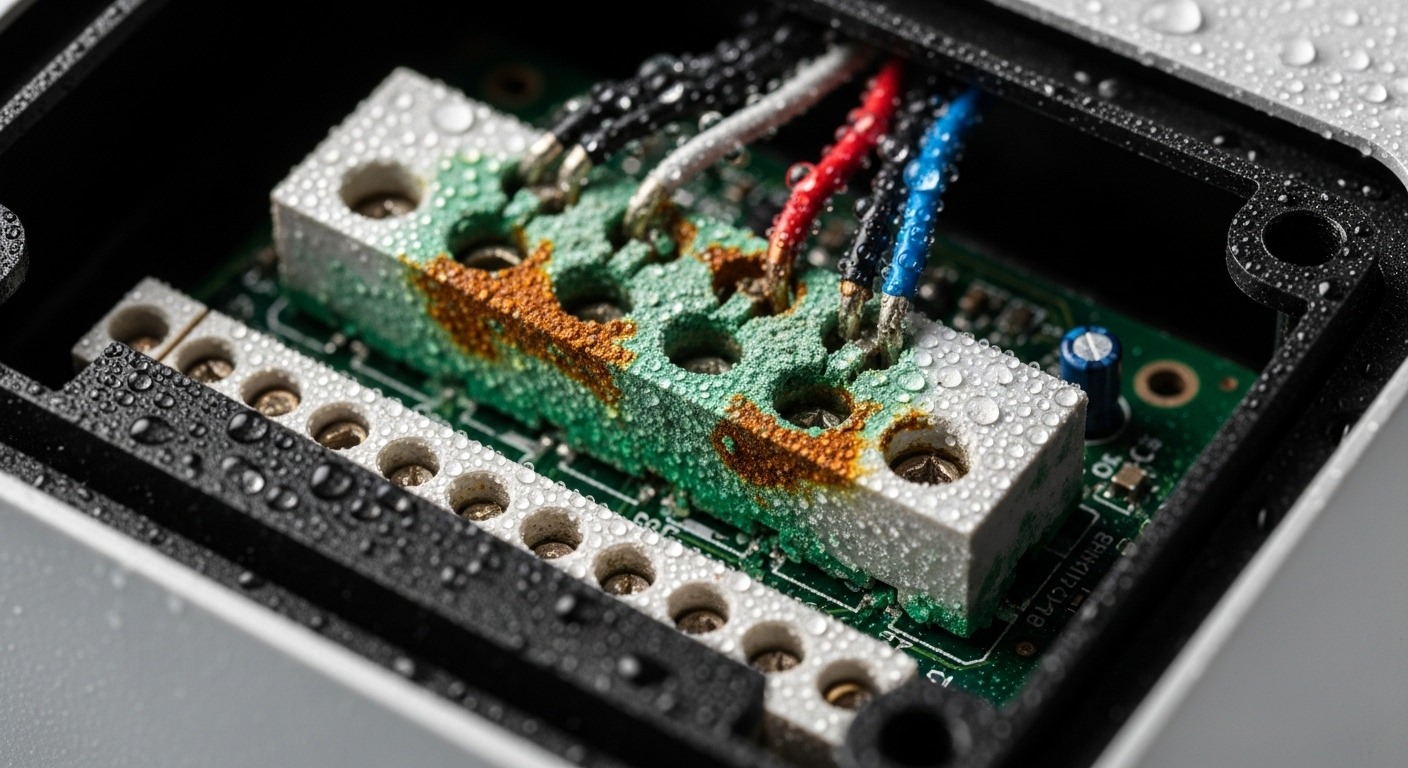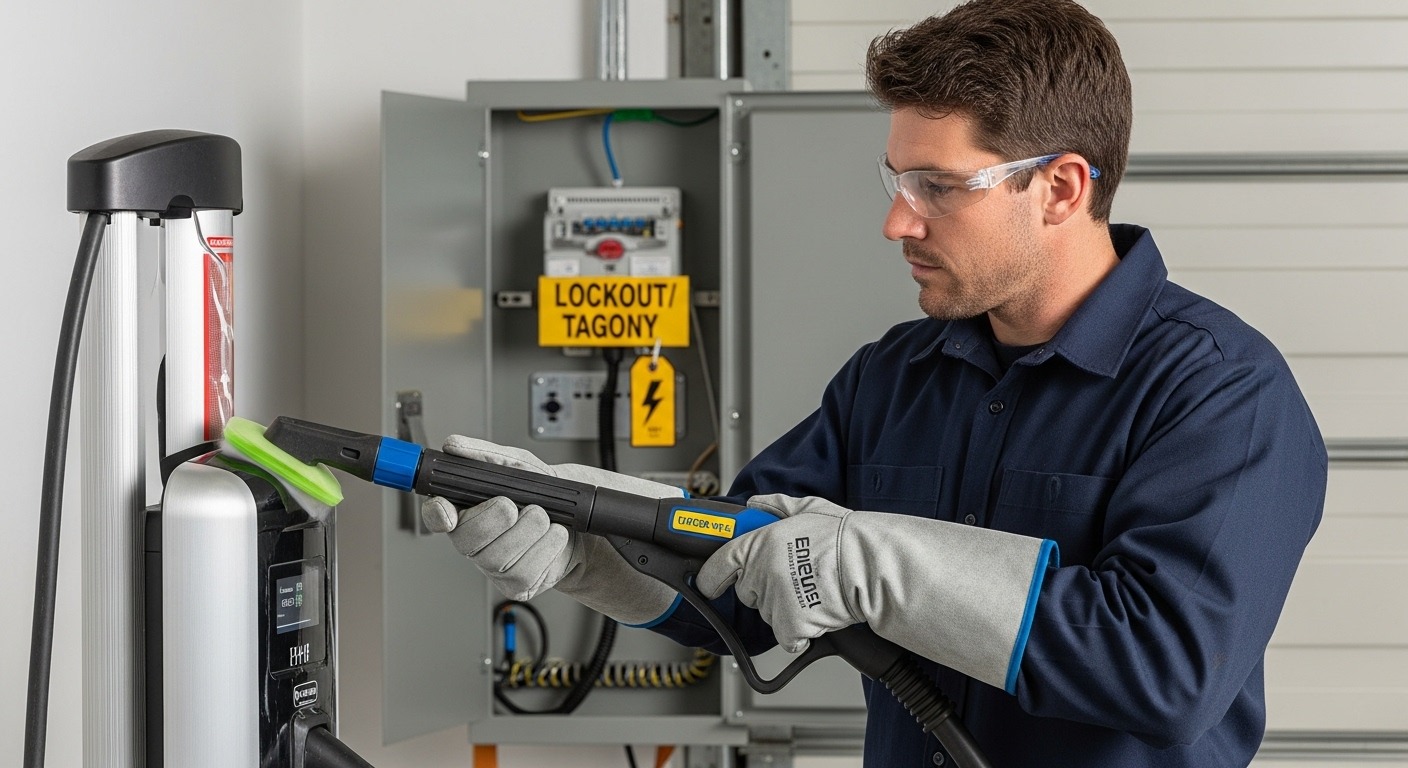Why Vancouver’s New Electric Vehicle Charging Stations Are Creating Safety Hazards Around Your Home (And How Pressure Washing Your EV Charging Area Prevents Electrical Dangers)
Worried about the electrical safety risks lurking around your shiny new EV charging station? You’re not alone – Vancouver homeowners are discovering that keeping these high-voltage systems clean and safe requires way more thought than just hosing them down with a garden sprayer.Picture this: you’ve just dropped serious cash on a Tesla Model Y and had a Level 2 charging station installed in your garage, feeling pretty good about your carbon footprint and your tech-savvy lifestyle. But then you notice your charging station is getting grimy from Vancouver’s notorious rain and humidity, and you start wondering – can I just blast this thing clean with my pressure washer? Spoiler alert: that’s exactly how people end up in the ER, or worse. [IMAGE PLACEHOLDER FOR IMAGE1]Vancouver’s rapidly expanding EV infrastructure is creating a whole new category of home maintenance challenges that most of us never saw coming. Between our coastal salt air, constant drizzle, and the fact that these charging stations are essentially giant electrical appliances hanging out in our garages and driveways, we’re dealing with a perfect storm of safety concerns that require some serious know-how to navigate safely.The thing is, EV charging stations aren’t just another piece of outdoor equipment you can treat like your deck furniture. These bad boys are pushing 240 volts through their systems – that’s the same voltage that powers your electric dryer, except it’s potentially getting wet every time it rains. When you throw pressure washing into the mix without proper precautions, you’re essentially playing electrical roulette with equipment that costs more than most people’s monthly rent.
Key Outtakes:
- EV charging stations require weekly cleaning and annual professional maintenance to prevent safety hazards and ensure optimal performance
- Pressure washing near electrical equipment without proper safety protocols can cause fatal electrocution, with documented fatalities across North America
- Professional cleaning services with electrical safety training are essential for maintaining charging stations safely while preserving equipment warranties
- Vancouver’s wet climate creates unique corrosion and moisture challenges requiring specialized maintenance approaches
- Ground Fault Circuit Interrupter (GFCI) protection and proper de-energization procedures are mandatory for safe cleaning operations

The Hidden Electrical Dangers Lurking in Your EV Charging Setup
Here’s what nobody tells you when you’re getting all excited about your new EV charging station: these things are basically giant electrical appliances that happen to live outside, and Vancouver’s climate is actively trying to destroy them 24/7. We’re talking about equipment that’s pushing serious voltage while getting constantly bombarded by moisture, salt air, and all the grime that comes with our Pacific Northwest lifestyle.  The real kicker? Most homeowners have zero clue about the electrical safety protocols needed to maintain these systems properly. You’ve got Level 2 charging stations operating at 240 volts – the same voltage that can absolutely ruin your day if you’re not careful. When you add water into the equation, whether it’s from our infamous Vancouver rain or from your well-intentioned pressure washing efforts, you’re creating conditions that can literally be fatal.What makes this even more dangerous is that EV charging stations look deceptively simple from the outside. They’re just a box on the wall with a cable, right? Wrong. These systems contain sophisticated electronics, high-voltage connections, and safety systems that can all be compromised by improper cleaning methods. The charging connectors alone require specific cleaning protocols to prevent damage that could affect your vehicle’s charging port – and trust me, replacing a damaged charging port on your Tesla isn’t exactly pocket change.
The real kicker? Most homeowners have zero clue about the electrical safety protocols needed to maintain these systems properly. You’ve got Level 2 charging stations operating at 240 volts – the same voltage that can absolutely ruin your day if you’re not careful. When you add water into the equation, whether it’s from our infamous Vancouver rain or from your well-intentioned pressure washing efforts, you’re creating conditions that can literally be fatal.What makes this even more dangerous is that EV charging stations look deceptively simple from the outside. They’re just a box on the wall with a cable, right? Wrong. These systems contain sophisticated electronics, high-voltage connections, and safety systems that can all be compromised by improper cleaning methods. The charging connectors alone require specific cleaning protocols to prevent damage that could affect your vehicle’s charging port – and trust me, replacing a damaged charging port on your Tesla isn’t exactly pocket change.
Why Vancouver’s Climate Makes EV Charging Station Maintenance Critical
Living in Vancouver means dealing with environmental challenges that most other cities don’t face when it comes to electrical equipment maintenance. Our coastal location brings salt-laden air that accelerates corrosion, while our infamous rain season means electrical equipment is constantly dealing with moisture exposure that can cause serious problems over time. The humidity levels in Vancouver create perfect conditions for moisture infiltration into electrical components, which leads to corrosion of wiring and connections. This isn’t just about aesthetics – we’re talking about safety hazards that develop over time as electrical connections degrade. Water exposure can cause malfunctions and create dangerous conditions that put both your property and your family at risk. The marine environment adds another layer of complexity, as salt contamination speeds up metal degradation and can cause electrical components to fail prematurely.Vancouver’s distinct seasons also create unique maintenance challenges that require adaptive scheduling. Our wet winters bring increased moisture exposure and potential ice formation around charging equipment, while summer heat can cause overheating issues in electrical components. The expansion and contraction cycles from temperature changes can damage cables and connections, especially when combined with the constant moisture exposure our climate provides.The thing that really gets me is how many people don’t realize that their charging station’s performance is directly affected by environmental contamination. Dirt, salt buildup, and moisture don’t just make your charging station look gross – they can actually slow down charging times and affect your EV’s battery health over the long term. Regular maintenance isn’t just about keeping things looking nice; it’s about ensuring your expensive investment continues to function properly and safely.What’s particularly challenging about Vancouver’s climate is the way different neighborhoods experience varying environmental stresses. If you’re living near the waterfront, you’re dealing with higher salt exposure that requires more frequent protective treatments. Inland areas might face different moisture and temperature cycles, but they’re still dealing with the overall high humidity levels that characterize our region. This means maintenance approaches need to be customized based on your specific location and environmental exposure.
The humidity levels in Vancouver create perfect conditions for moisture infiltration into electrical components, which leads to corrosion of wiring and connections. This isn’t just about aesthetics – we’re talking about safety hazards that develop over time as electrical connections degrade. Water exposure can cause malfunctions and create dangerous conditions that put both your property and your family at risk. The marine environment adds another layer of complexity, as salt contamination speeds up metal degradation and can cause electrical components to fail prematurely.Vancouver’s distinct seasons also create unique maintenance challenges that require adaptive scheduling. Our wet winters bring increased moisture exposure and potential ice formation around charging equipment, while summer heat can cause overheating issues in electrical components. The expansion and contraction cycles from temperature changes can damage cables and connections, especially when combined with the constant moisture exposure our climate provides.The thing that really gets me is how many people don’t realize that their charging station’s performance is directly affected by environmental contamination. Dirt, salt buildup, and moisture don’t just make your charging station look gross – they can actually slow down charging times and affect your EV’s battery health over the long term. Regular maintenance isn’t just about keeping things looking nice; it’s about ensuring your expensive investment continues to function properly and safely.What’s particularly challenging about Vancouver’s climate is the way different neighborhoods experience varying environmental stresses. If you’re living near the waterfront, you’re dealing with higher salt exposure that requires more frequent protective treatments. Inland areas might face different moisture and temperature cycles, but they’re still dealing with the overall high humidity levels that characterize our region. This means maintenance approaches need to be customized based on your specific location and environmental exposure.
Professional Pressure Washing Protocols for Electrical Safety
Now that we’ve established why your EV charging station needs regular cleaning and why Vancouver’s climate makes this especially critical, let’s talk about how to do it safely. This is where things get serious, because we’re dealing with potentially deadly combinations of water and electricity that require professional-grade safety protocols.  The first thing you need to understand is that cleaning EV charging equipment requires complete de-energization and proper lockout/tagout procedures. This isn’t like washing your car where you can just spray and go – we’re talking about electrical systems that need to be safely isolated before any water gets near them. Professional maintenance teams follow established electrical safety standards that prevent accidental energization during cleaning operations, which is absolutely critical for preventing electrocution.Ground Fault Circuit Interrupter (GFCI) protection is mandatory for any electrical operations involving water exposure. These devices monitor electrical current flow and immediately shut off power when they detect ground faults that could cause electrocution. But here’s the thing – just having GFCI protection isn’t enough if you don’t know how to test it properly and ensure it’s functioning correctly before you start any cleaning operations.Professional cleaning services utilize specialized protective equipment including insulated tools, arc-rated clothing, and environmental controls to manage water exposure safely. They create controlled conditions that allow effective cleaning while minimizing electrical hazards through proper drainage systems and weather-resistant procedures. This isn’t equipment you can pick up at Home Depot – we’re talking about professional-grade safety gear designed specifically for electrical work.The cleaning materials themselves are another critical consideration that most homeowners completely overlook. You can’t just grab whatever cleaner is under your kitchen sink and go to town on your charging station. Professional-grade cleaning solutions are specifically designed for electrical equipment and won’t damage sensitive electronic components or void manufacturer warranties. Using the wrong cleaning products can cause serious damage that costs way more than professional cleaning would have.Temperature management is another factor that professional services account for during cleaning operations. Electrical components can be damaged by sudden temperature changes, so proper cleaning protocols include allowing equipment to reach ambient temperature before applying water or cleaning solutions. This prevents thermal shock that could damage internal components or create additional safety hazards.
The first thing you need to understand is that cleaning EV charging equipment requires complete de-energization and proper lockout/tagout procedures. This isn’t like washing your car where you can just spray and go – we’re talking about electrical systems that need to be safely isolated before any water gets near them. Professional maintenance teams follow established electrical safety standards that prevent accidental energization during cleaning operations, which is absolutely critical for preventing electrocution.Ground Fault Circuit Interrupter (GFCI) protection is mandatory for any electrical operations involving water exposure. These devices monitor electrical current flow and immediately shut off power when they detect ground faults that could cause electrocution. But here’s the thing – just having GFCI protection isn’t enough if you don’t know how to test it properly and ensure it’s functioning correctly before you start any cleaning operations.Professional cleaning services utilize specialized protective equipment including insulated tools, arc-rated clothing, and environmental controls to manage water exposure safely. They create controlled conditions that allow effective cleaning while minimizing electrical hazards through proper drainage systems and weather-resistant procedures. This isn’t equipment you can pick up at Home Depot – we’re talking about professional-grade safety gear designed specifically for electrical work.The cleaning materials themselves are another critical consideration that most homeowners completely overlook. You can’t just grab whatever cleaner is under your kitchen sink and go to town on your charging station. Professional-grade cleaning solutions are specifically designed for electrical equipment and won’t damage sensitive electronic components or void manufacturer warranties. Using the wrong cleaning products can cause serious damage that costs way more than professional cleaning would have.Temperature management is another factor that professional services account for during cleaning operations. Electrical components can be damaged by sudden temperature changes, so proper cleaning protocols include allowing equipment to reach ambient temperature before applying water or cleaning solutions. This prevents thermal shock that could damage internal components or create additional safety hazards.
Specialized Equipment Requirements
Professional EV charging station cleaning requires equipment that goes way beyond your typical residential pressure washer. We’re talking about machines with precise pressure controls, heated water capabilities for effective cleaning in cold weather, and specialized nozzles designed for electrical equipment maintenance. The pressure settings need to be carefully controlled to prevent water infiltration into electrical components while still providing effective cleaning power.Mobile service capabilities are particularly important in Vancouver because many charging stations are installed in locations without convenient water access. Professional mobile pressure washing services come equipped with self-contained water systems and electrical generators that allow them to work safely in remote locations without requiring property owners to provide water sources or electrical connections. This eliminates additional safety risks associated with running extension cords or water hoses across property.The water quality used for cleaning is another consideration that professionals account for. Vancouver’s municipal water supply is generally excellent, but for sensitive electrical equipment, some services use deionized or distilled water to prevent mineral deposits from building up on components. This is especially important for the charging connectors and display screens that require precise functioning for proper operation.
Warranty Protection and Insurance Compliance
Here’s something that might shock you – many EV charging station warranties require

